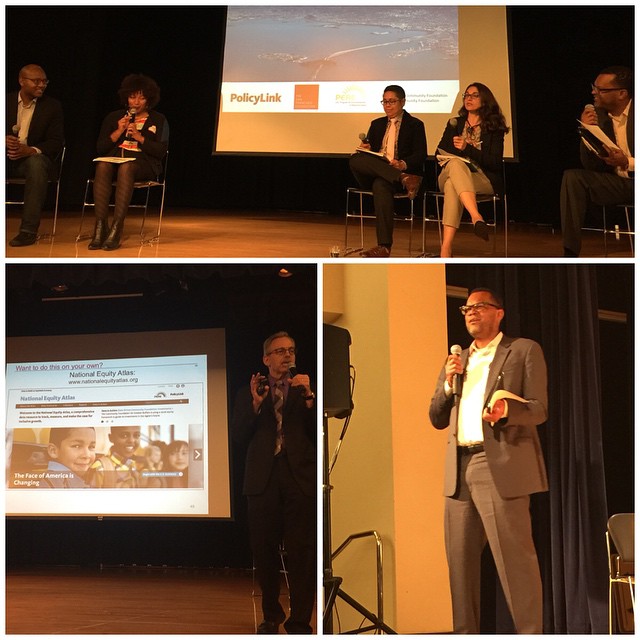[April 22, 2015] OAKLAND. Thanks to the Rev. Jesse Jackson, there has recently been a lot of talk about technology and its lack of diversity. Some of the Silicon Valley tech giants have pledged to do something about the disparities of underrepresented minorities, women, LGBT, persons with disabilities, veterans, etc., however, it seems that there has been a lot more “talk” going on but little action.
Vator Splash is taking place today and tomorrow in Oakland. Vator, Inc.’s mission is “to help great entrepreneurs find funding, and for investors to get in on the ground floor of tomorrow’s leading companies. There a lot of workshops and seminars designed to marry entrepreneurs with investors, which in theory, will provide opportunities for underrepresented groups to have access to the tech world, but does not affect the tech giants or more mature startups disparities in the valley. Similarly, the PushTech 2020 Summit will take place on May 6th. This event will feature more panels regarding funding opportunities, a pitch competition, and supplier diversity opportunities for small businesses. Nevertheless, at first blush, these events are not targeted at having a significant impact on moving the needle from diversity being the noun, versus inclusion being the verb in changing the face of Silicon Valley to reflect at least the population of the Bay Area, the State of California, or the nation.
Not everyone has the determination, motivation, creativity, and other qualities needed to be a successful entrepreneur. Moreover, there is this misnomer that everyone who works at a startup in Silicon Valley is right out of college, with a computer science or engineering degree, or a coder. There are numerous other jobs in tech that are not just hardcore science related jobs, such as sales, HR, recruiting, accounting, legal, real estate, etc. and increasing diversity in these areas makes tech more inclusive.
The way that I see it, there are three areas of focus in order to make the tech world more inclusive:
Making the tech industry more inclusive has more benefits than meets the eye. Today, I was fortunate enough to attend an event called “Building An All-In Bay Area” organized by the San Francisco Foundation and sponsored by PolicyLink and USC’s Program for Environmental & Regional Equity. It basically was a satelite overview of data complied from extensive research on equity, or lack thereof, throughout the Bay Area. For example, although the racial/ethnic composition is projected to increase until 2040, the Black population is projected to decrease. Wages grew significantly for middle and high wage workers aged 25-64 from 1979-2012 in the Bay Area, but decreased for lower waged workers. Lastly, people of color have lower wages and higher unemployment rates. It might be naive, but more inclusivity in the tech industry will allow people of color to earn higher paying jobs, the ability to live in the communities where they work, have their tax paying dollars be applied to the schools that their children will attend, and improve the Bay Area’s overall quality of life.
For more information about the study on Equity, please visit http://nationalequityatlas.org.
Kevin L. Nichols is an entrepreneur, a legal technology, diversity, social media, and political consultant who resides in the Bay Area. He is a passionate community organizer and activist. Kevin is affectionately known as The Social Politician™ and The Social Engineer™ who is engineering a better life for the next generation, socially. For more information, please visit www.kevinlnichols.com.
Vator Splash is taking place today and tomorrow in Oakland. Vator, Inc.’s mission is “to help great entrepreneurs find funding, and for investors to get in on the ground floor of tomorrow’s leading companies. There a lot of workshops and seminars designed to marry entrepreneurs with investors, which in theory, will provide opportunities for underrepresented groups to have access to the tech world, but does not affect the tech giants or more mature startups disparities in the valley. Similarly, the PushTech 2020 Summit will take place on May 6th. This event will feature more panels regarding funding opportunities, a pitch competition, and supplier diversity opportunities for small businesses. Nevertheless, at first blush, these events are not targeted at having a significant impact on moving the needle from diversity being the noun, versus inclusion being the verb in changing the face of Silicon Valley to reflect at least the population of the Bay Area, the State of California, or the nation.
Not everyone has the determination, motivation, creativity, and other qualities needed to be a successful entrepreneur. Moreover, there is this misnomer that everyone who works at a startup in Silicon Valley is right out of college, with a computer science or engineering degree, or a coder. There are numerous other jobs in tech that are not just hardcore science related jobs, such as sales, HR, recruiting, accounting, legal, real estate, etc. and increasing diversity in these areas makes tech more inclusive.
The way that I see it, there are three areas of focus in order to make the tech world more inclusive:
- Pipeline – Tech companies need to fund nonprofit organizations designed to encourage youth to pursue careers involving math, science, and engineering (AKA STEM). There are many notable organizations such as my friends, Kimberly Bryant’s Black Girls Code, Kalimah Priforce’s Qeyno Labs, and Wayne Sutton’s BUILDUP that are making a tremendous impact inspiring youth to pursue technology. Moreover, my friend, Professor Bryan Brown and I have partnered to expose 11-12 year olds to math and science at Stanford University’s Science in the City camp and I am planning a STEM related camping conference this fall for a 150 high school students. Investing in the future creates the necessary pipeline to have underrepresented groups at the table when it is time to hire eligible talent.
- Seeking and Retaining Eligible Talent – It is not enough to recruit at a few Black colleges, all women colleges, etc., tech companies need to also seek these individuals out at the mainstream institutions that they recruit at. Furthermore, they need to have a retention policy/plan in place to make these underrepresented groups (which some make up 1% of the workforce based on the study referenced earlier in some cases) feel welcome and included. At least Affirmative Action gave employers incentives to consider diverse talent before hiring them. Tech now needs its own version of the Rooney Rule , which requires National Football League teams to interview minority candidates for head coaching and senior football operation jobs.
- Retraining Those Suffering From Age Discrimination – Surprisingly, if you are 38 or older, you are “over the hill” in Silicon Valley. There is a huge disparity of age in tech, where older job seekers feel that they are overlooked for opportunities. Although the younger generation has moved away from Facebook and Twitter to Snapchat and Vine, older (in this case 38+) are capable of learning coding, software languages, IT, etc., in addition to the traditional skills like accounting, finance, HR, management, legal, etc. The tech industry needs to soften it’s emphasis on the “hip culture” of t-shirts and khakis at work, playing volleyball at lunch, and the like and diversify its workforce with people that can still get the job done (and have a little fun too!). This is in-line with President Obama’s New TechHire Initiative to provide pathways for the middle class to get jobs.
Making the tech industry more inclusive has more benefits than meets the eye. Today, I was fortunate enough to attend an event called “Building An All-In Bay Area” organized by the San Francisco Foundation and sponsored by PolicyLink and USC’s Program for Environmental & Regional Equity. It basically was a satelite overview of data complied from extensive research on equity, or lack thereof, throughout the Bay Area. For example, although the racial/ethnic composition is projected to increase until 2040, the Black population is projected to decrease. Wages grew significantly for middle and high wage workers aged 25-64 from 1979-2012 in the Bay Area, but decreased for lower waged workers. Lastly, people of color have lower wages and higher unemployment rates. It might be naive, but more inclusivity in the tech industry will allow people of color to earn higher paying jobs, the ability to live in the communities where they work, have their tax paying dollars be applied to the schools that their children will attend, and improve the Bay Area’s overall quality of life.
For more information about the study on Equity, please visit http://nationalequityatlas.org.
Kevin L. Nichols is an entrepreneur, a legal technology, diversity, social media, and political consultant who resides in the Bay Area. He is a passionate community organizer and activist. Kevin is affectionately known as The Social Politician™ and The Social Engineer™ who is engineering a better life for the next generation, socially. For more information, please visit www.kevinlnichols.com.


 RSS Feed
RSS Feed